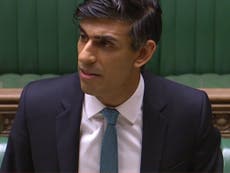Boris Johnson’s unpleasant similarities with Trump are chilling
Reading the new book by prominent Republican Stuart Stevens’, it’s apparent how the Conservative Party has been pulled in a similar direction to the GOP


Your support helps us to tell the story
From reproductive rights to climate change to Big Tech, The Independent is on the ground when the story is developing. Whether it's investigating the financials of Elon Musk's pro-Trump PAC or producing our latest documentary, 'The A Word', which shines a light on the American women fighting for reproductive rights, we know how important it is to parse out the facts from the messaging.
At such a critical moment in US history, we need reporters on the ground. Your donation allows us to keep sending journalists to speak to both sides of the story.
The Independent is trusted by Americans across the entire political spectrum. And unlike many other quality news outlets, we choose not to lock Americans out of our reporting and analysis with paywalls. We believe quality journalism should be available to everyone, paid for by those who can afford it.
Your support makes all the difference.Reading former Republican operative Stuart Stevens’ It Was All a Lie: How the Republican Party Became Donald Trump, a new fierce critique of what the party has become under Donald Trump, I found myself asking a question: how much of it could be applied to Boris Johnson and the Conservative Party he has created?
Yes, yes, I know. The US and the UK are not “two countries divided by a common language” and it’s ridiculous to pretend that we are. The political and cultural contexts are very different.
But that doesn’t change the fact that there has long been a transatlantic exchange of ideas between the two nations’ centre-right parties and there are some disturbing parallels in the rise of Trump and his debasement of Grand Old Party and the rise of Johnson and the debasement of the Tories.
Stevens, part of the Lincoln Project, that small but vocal corps of never-Trump Republicans, which produced some of the sharpest attacks on the party in the run-up to the US election, traces the roots of Trumpism and asks if he or someone like him wasn’t always lurking at the end of the line given the GOP’s direction of travel.
He’s refreshingly honest about his own role. For example, he takes us back to his first campaign in Mississippi, a Democrat stronghold at the time. The ads he created prominently featured an independent African American candidate with the aim of alerting black voters to his presence and siphoning off their votes from his man’s Democratic opponent. It worked.
The Republicans’ failure to understand the hostility of African American towards them (Stevens says they refused to confront the fact that their policies were at the root of their party’s problem) is a theme running through the book. It’s a theme I initially set aside when I started rolling the comparison around in my mind because, context. The drivers of Nixon’s infamous “southern strategy”; segregation, the Jim Crow laws of former confederate states, the civil rights struggles of the 60s, they don’t exist in a British context.
But then I spent some time bathing in the British right wing Twitter-verse. Then I had to take a real life shower. What was clear from that unpleasant exercise is that there is some read across.
There are plenty of Tories willing to stoke the flames of Islamaphobia, for example, either opening or through dog whistles. Trump’s done this, but the Tory version, which its leaders refuse to acknowledge even as they piously criticise Labour’s issues with anti-semitism, is arguably more developed and putrid.
There’s the same fierce opposition to immigration, including legal immigration, used as (thin) cover for racism. It played an important role in a Brexit campaign that was dominated by Johnson and his allies.
Remember Nigel Farage’s “full up” poster. Yes, I know that wasn’t a Conservative creation. Farage isn’t a Conservative. But he’s helped pull the party it in a similar direction to the Republicans and often served as a convenient outrider for Johnson and his pals in Vote Leave through his willingness to say the things they didn’t want to say for fear of frightening off more moderate voters.
Don’t let’s kid ourselves. The Tories have some of the “white grievance" Stevens castigates in the GOP, and they have very effectively weaponised it under Johnson, whose past columns have featured crudely racist language.
Britain mercifully lacks anything like the American religious right, with its hypocritical embrace of tragically flawed leaders who preach do as I say not as I do and have even the most grotesque sins forgiven by their devoted followers, in a process that has reached its zenith with Trump.
But the Tories have certainly sacrificed supposed principles on the mantle of expediency and winning, Stevens attacks the Trump Republicans for doing the same.
They’ve sniped at many of the institutional bulwarks that make Britain what it is; the civil service, the BBC, the nation’s international agreements, the court system. Trump sought to co-opt the latter with his appointment of conservative judges. Johnson has plans to simply sideline the judiciary with the aim of protecting ministers from judicial review. The rule of law is for the little people.
With Brexit, a party allegedly committed to free trade has abandoned the biggest free trade zone the world has ever seen. The union hangs by a thread. Voter suppression is on the menu with plans to mirror Republican voter ID laws having been detailed in last year’s Queen’s speech.
Shall I go on? Rare moderate Republicans either get primaried or, where they are popular like its northern governors, ignored. Johnson ruthlessly purged moderate/sensible Tories in the last Parliament.
He isn’t as dominant as Trump. You want to be a Tory MP? You better sign up for Brexit but there’s more debate on other issues. Johnson has had trouble with his backbenchers, even with a majority of more than 80. Sometimes this has come from his rightward flank, such as the opposition to Covid restrictions some have shown. Unlike Trump, who scarcely has a rightward flank at all, Johnson isn’t a virus denier.
His chancellor Rishi Sunak has borrowed heavily during the pandemic, and enacted measures like the Job Retention Scheme that you’d never imagine a Republican countenancing. Lately he’s shown signs that he’s worrying about the debt he’s run up, and is even contemplating tax rises. Trump’s GOP has jettisoned its supposed fondness for fiscal responsibly, although it may suddenly return with Joe Biden in the White House. Tax rises are anathema. Its elected representatives routinely sign up to Grover Norquist’s “Taxpayer Protection Pledge”.
Some of Johnson’s problems with his party come from a more liberal place. You wouldn’t expect to see one of today’s Republicans resigning over cuts to the international aid budget like Baroness Sugg did this week, nor would you expect to see a flare-up in the party over a refusal to provide free school meals during holidays as happened here.
It’s often said the Tories have been hollowed out by Johnson. These incidents would nonetheless indicate that its church is still broader than that of its transatlantic peer.
But that doesn’t make reading Stevens’ book in the context of where Britain sits any less troubling.
The similarities that exist are unpleasant to contemplate.
The book’s most disturbing passage is when Stevens sets Trump’s behaviour against the four behavioural warning signs of an authoritarian proposed by the authors of How Democracies Die.
They are a rejection, in words or actions, of the democratic rules of the game, the denial of the legitimacy of opponents, the tolerance or encouragement of violence, a willingness to curtail the civil liberties of opponents including the media.
Trump, he says, ticks every box. The evidence for that which he sets out is convincing. US commentators have voiced fears that a more competent successor could easily have strangled the nation’s democracy. It could still happen.
I can’t unequivocally make the same case against Johnson although he’s certainly had his moments and some of his behaviour, his actions, his plans, his parallels with Trump, are chilling enough.





Join our commenting forum
Join thought-provoking conversations, follow other Independent readers and see their replies
Comments